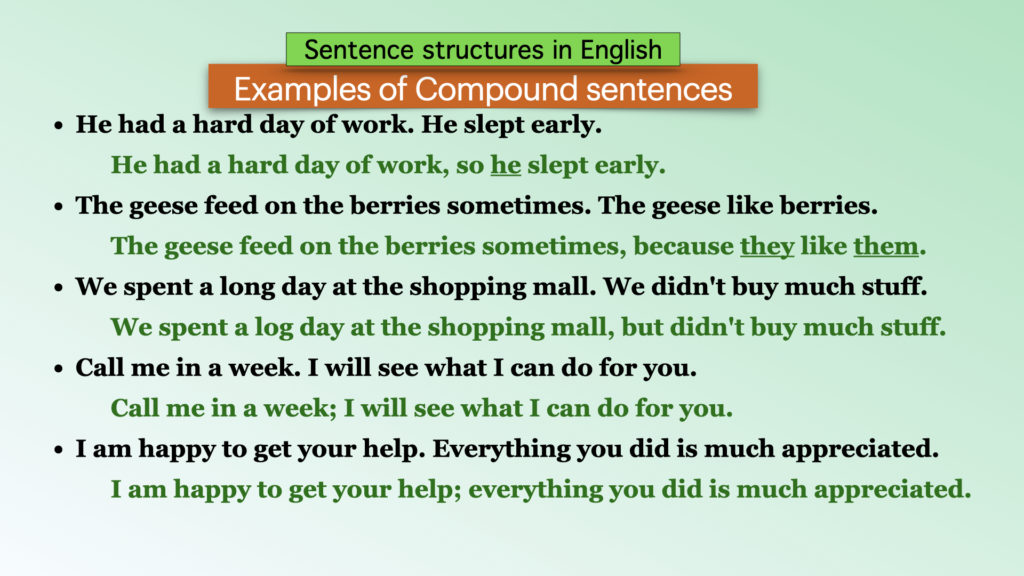There are four type of sentences according to structure:
- Simple sentences (independent clauses)
- Compound sentences
- Complex sentences
- Compound complex sentences
In order to understand what are different sentence structures in English, it is important to understand what is a clause in a sentence. Let’s read about it.
What is a clause? Definition and Examples
A clause is a group of related words; but unlike a phrase, a clause has a subject and verb.
An independent clause, along with having a subject and verb,
- expresses a complete thought
- can stand alone
- may form part of a compound or complex sentence or it may be a complete sentence in itself
- Example:He is riding a bike.(Independent clause)
A Dependent Clause
- does not express a complete though
- needs to be combined with an independent clause to make complete sense.
- Example: When he rides a bicycle, he is very fast.(when he rides a bicycle is a dependent clause since it does not make complete sense without the independent clause which is “he is very fast.”)
Types of Sentences
Simple Sentences
Simple sentences convey a complete message. Or as the dictionary definition says:
“a sentence consisting of only one clause, with a single subject and predicate”
Subject: What or whom the sentence is about
Predicate: Predicate tells something about the subject.
Here are some examples of the simple sentences:
I took a cab to my hotel.
He is a great scholar.
The sun is shining.

Compound sentences
Definition:
Two or more simple sentences (independent clauses) joined together by a coordinating conjunction are called a compound sentence.And, but, for, nor, or, so, and yet are coordinating conjunctions used in compound sentences.
Examples:
I went to the gym. I did a lot of weight lifting.
I went to the gym and did a lot of weight lifting.
She kept working on her assignment for long. She couldn’t complete the assignment.
She kept working on her assignment, yet she couldn’t complete it.
I like to read stories. My sister hates fiction.
I like to read stories, but my sister hates fiction.
He had a hard day of work. He slept early.
He had a hard day of work, so he slept early.
The geese feed on the berries sometimes. The geese like berries.
The geese feed on the berries sometimes, because they like them.
We spent a long day at the shopping mall. We didn’t buy much stuff.
We spent a log day at the shopping mall, but didn’t buy much stuff.
Call me in a week. I will see what I can do for you.
Call me in a week; I will see what I can do for you.
I am happy to get your help. Everything you did is much appreciated.
I am happy to get your help; everything you did is much appreciated.
Complex Sentences
Complex sentences have one independent clause joined by one or more dependent clauses(subordinate clauses) and. For example:
When I saw Eiffel Tower, I was spell bound.
As soon as I started out, it began to rain.
Whenever Tom visits a new place, he tries to explore its museums.
Even though the roads were full of snow, many cars were seen on the highway.
She passed her road test quickly, although she did not do much practice on driving.
Complex sentences with relative clause (Relative clauses starting with who, that, which etc)
I went to see my friend, who lives near the park.
Harry came up with a question that was difficult to answer.
I found the keys, which I was trying to find.
Compound-Complex sentences
Definition
Combine Two independent clauses with one or more dependent clauses. Can also contain both subordinating and coordinating clauses or conjunctions.
Examples
Since the park was well maintained, many people visited it regularly and enjoyed their time there.(The park was well maintained. Many people visited it regularly. They enjoyed their time in the park.)
After I booked my travel, I packed my luggage and started calling my friends.(I booked my travel. I packed my luggage. I started calling my friends.)
For interactive grammar quizzes, follow the link below:
